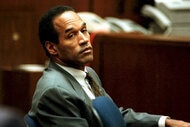Create a free profile to get unlimited access to exclusive videos, breaking news, sweepstakes, and more!
How The 2002 Olympic Figure Skating Judging Scandal Changed The Sport Forever
The 2002 Olympic scandal involving Canada’s Jamie Salé and David Pelletier and Russia’s Elena Berezhnaya and Anton Sikharulidze, changed the way the sport is judged.

Sometimes it takes an injustice to create change for the better. That’s exactly what happened in the world of figure skating after a worldwide 2002 judging scandal, at the heart of a new docuseries.
“Meddling,” a four-part Peacock docuseries dives deep into the behind-the-scenes plots and maneuvering at the 2002 Salt Lake City Winter Olympics.
When Canada’s Jamie Salé and David Pelletier came in second to Russia’s Elena Berezhnaya and Anton Sikharulidze, allegations began brewing that the competition was fixed. By the end of the high profile scandal, French judge Marie-Reine Le Gougne, was suspended for three years and the Canadians got their gold medal, the BBC reported.
But the end results had other long-lasting effects. In fact, it changed the way the sport is judged altogether. Olympic figure skater Tara Lipinski executive produced the docuseries about the scandal, “Meddling”, with her husband Todd Kapostasy and she told Oxygen.com that the scandal changed the entire way that the sport is judged.
Lipinski, who became the youngest Olympic gold medalist in the history of figure skating in 1998, told Oxygen.com that prior to the scandal, "I think everyone in the sport knew that skating was subjective and that at times it could be political."
"You could do your program perfectly and not fall and then someone else could stake a program where they fell twice and they could still win and you’d walk off the ice and you’d just look at your coach and say, 'well, that’s skating without really overthinking it.'"
She said that the scandal, however, pushed the sport to examine the judging system and, ultimately, make important changes.
"To think that we skated under a system where there really was no criteria for the judges to accurately judge the skater’s technical and artistic abilities, it’s kind of mind-boggling now," she said. "Thank goodness that the judging system has changed so now that every step and glide and jump and spin and movement is taken into account and judged and now it’s very technical and hard for the viewers at home to understand but it’s a lot more fair."
She said the changes began almost immediately after the investigation began.
“Pretty much as soon as the investigation started, I think immediately things were put into motion where a new judging system started to form and obv that took a lot of time and care to make a system that would work," she said.
She called the current system "intricate" and said it's “now it’s down to a science”
“I’ll break it down for you," she told USA Today. "Back in the day, it was the 6.0 system. So a judge would sit there [and] have no criteria that needed to be met. No bullet points on the technical aspect of the sport or the artistic aspect of the sport. It was just who you preferred in that moment. And they would toss up a 5.8 or a 5.9 or 6.0, and that would change someone’s life forever.”
She is grateful that the 2002 scandal shook things up.
"Thank goodness this has happened, and it wasn’t swept under the rug," she told USA Today. "And I think we’re lucky that this happened in the United States at an Olympic Games because we don’t know if it happened somewhere else, if the media attention or the outrage would have been the same and had the same impact.”
In the wake of the scandal, the International Skating Union (ISU) also introduced a number of reforms to the sport. One such change was a system of anonymity. Judges could list their marks without having their names attached to the scores. While the aim was to protect judges from backlash if they didn't vote favorably for athletes connected to their own nation, some argued that it lacked transparency. As a result, the ISU officially banned anonymous judging altogether in 2016.
























